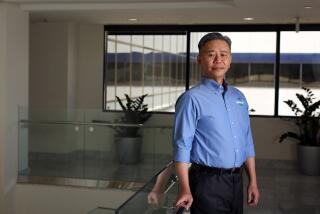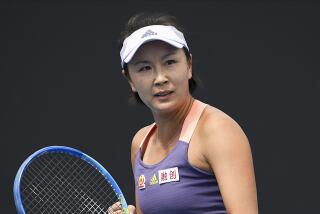Talk-Show King Is Yanked From Chinese Airwaves
- Share via
SHANGHAI — For two years, Larry Lang relished his role as China’s business talk-show king.
On Friday night television, the Taiwan-born host of “Larry Lang Live” railed against corporate corruption and other ills of China’s market reforms. The clean-cut, telegenic finance professor boiled economics down to ordinary chatter and he struck a nerve with folks disenchanted with the sagging stock market and widening income disparity.
But this month, Chinese officials pulled the plug on his program -- the latest move by Beijing to censor influential critics of its policies and to control information disseminated to the public. In the last year, the government has jailed journalists, banned dozens of newspapers and restricted searches on the Internet.
Online, many Chinese quickly voiced support for Lang, whose writings and opinions are widely available on the Web.
China Business Network, the Shanghai-based producer of the show, said the 49-year-old Lang was taken off the air because he didn’t qualify for a government certificate for TV and radio hosts. CBN refused to elaborate, and Lang declined to comment.
Analysts, though, weren’t surprised that Lang’s show was shut down.
Mainland Chinese and foreign economists in China regarded the Wharton-educated Lang as a free-thinking, fast-talking commentator, yet his views were caustic and considered one-sided.
“Lang went too far.... His words intensified social conflicts,” said Yi Xianrong, an international finance researcher at the Chinese Academy of Social Sciences.
Lang’s half-hour show made its final broadcast March 3, two days before the start of the National People’s Congress, China’s legislature.
During the 10-day session, Communist Party leaders sought to drum up support for the government’s new rural reform programs, amid increasing protests from farmers upset about land seizures and corruption, something that Lang has criticized.
“He tapped into a lot of latent discontent on China’s less-than-perfect privatization record,” said Stephen Green, an economist at Standard Chartered Bank in Shanghai.
In some ways, Lang had become too famous for his own good. “He’s a celebrity now.... There aren’t that many people who have achieved that level of popularity and influence outside of the party,” Green said.
Lang’s sudden departure from TV sparked considerable discussion this week in Chinese Internet chat rooms. Some wondered whether Lang’s background contributed to his troubles. Lang, the son of a Kuomintang officer who escaped from the mainland, teaches at Chinese University of Hong Kong. A onetime naturalized American citizen, Lang is a Hong Kong Chinese citizen.
He has been particularly critical of management-led buyouts of state-owned enterprises, blasting them as underhanded schemes that enriched managers and left employees in the cold. In mid-2004, Lang said Gu Chujun, chief executive of Shanghai refrigerant company Greencool Group, had personally profited from a restructuring deal. The next year, Gu was arrested, and the government banned management buyouts.
That helped to boost Lang’s rankings on TV. The animated, bespectacled professor basked in the limelight, boasting publicly that Shanghai women found watching his show as fashionable as owning a Louis Vuitton bag. Demand for public appearances soared, as did his engagement fees.
At the same time, Lang became a scourge of companies, and some mainland Chinese academics complained about his grandstanding and were clearly annoyed by his celebrity status and aggressive style.
“He is a public figure, a media person, but not a scholar anymore,” said Hua Ming, a Fudan University economist who sparred with Lang on the air. Hua wouldn’t comment about the cancellation of the TV program.
Other China analysts said Lang got in trouble because he criticized specific individuals and companies.
The risk might have been heightened because Lang wasn’t a lone voice in the wilderness. He led an increasingly vocal group of so-called new leftists who have attacked the failings of the privatizing of state-owned assets and China’s economy.
By all accounts, that has clearly been heard in Beijing.
“I think the leadership seems to have realized that the action of the left has had an impact,” said Green, the Shanghai economist. “It’s reached a fever pitch, ... a level of concern to senior leaders. They decided there needed to be some limits on the criticism from the left.”
*
Cao Jun of The Times’ Shanghai Bureau contributed to this report.
More to Read
Sign up for Essential California
The most important California stories and recommendations in your inbox every morning.
You may occasionally receive promotional content from the Los Angeles Times.











